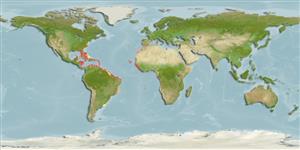分类 / Names
俗名 | 同种异名 | Catalog of Fishes(属, 种) | ITIS | CoL | WoRMS | Cloffa
Teleostei >
Ovalentaria/misc (Various families in series Ovalentaria)
鱸形目 (Various families in series Ovalentaria) >
Pomacentridae (Damselfishes)
雀鯛科(Damselfishes) (Damselfishes) > Glyphisodontinae
Etymology: Abudefduf: Arabic, abu = father; this fish is the leader of the reef against other species (Ref. 45335).
More on author: Linnaeus.
Environment: milieu / climate zone / 深度上下限 / distribution range
生态学
海洋 礁区鱼类; 非迁移的; 深度上下限 0 - 20 m (Ref. 58047), usually ? - 10 m (Ref. 86997). 亞熱帶的; 41°N - 37°S, 89°W - 14°E
Atlantic Ocean: Canada (Ref. 5951) to Rhode Island, USA to Uruguay in the western Atlantic, abundant on Caribbean reefs; around islands of the mid-Atlantic, Cape Verde, and along the tropical coast of western Africa south to Angola. This species is strictly an Atlantic species. It is replaced in the Indo-Pacific region by the closely related Abudefduf vaigiensis (G. Allen, pers. comm.).
大西洋: 羅德島州, 美國到烏拉圭在大西洋西部中, 豐富的在加勒比海的礁上; 中大西洋,維德角的島周圍, 而且沿著非洲西部的熱帶海岸南至安哥拉。 這種嚴格地是一個大西洋的種。 它是藉由接近地印度-太平洋的區域取代講 條紋豆娘魚〔Abudefduf vaigiensis〕 (G. 艾倫, pers. comm.)。
Length at first maturity / 大小 / 重量 / 年龄
成熟度: Lm 15.0, range 10 - ? cm
Max length : 22.9 cm TL 雄鱼/尚未辨别雌雄; (Ref. 26340); common length : 15.0 cm SL 雄鱼/尚未辨别雌雄; (Ref. 3139); 最大体重: 200.00 g (Ref. 5288)
背棘 (总数) : 13; 背的软条 (总数) : 12 - 13; 臀棘: 2; 臀鳍软条: 10 - 12. Greenish yellow above, shading to white below, with 5 prominent vertical black bars that narrow toward belly (Ref. 26938). A faint sixth bar may be present posteriorly on caudal peduncle; a black spot at upper base of pectoral fin. The adult male becomes dark bluish, the black bars thus less conspicuous on the body (Ref. 13442).
Body shape (shape guide): short and / or deep.
黄绿色的上方, 颜色变化成腹面白色的,5 突出的垂直黑色的横带对于腹面的那狭窄者.(参考文献 26938) 一条模糊的第六条横带可能是存在的在尾柄后面; 在胸鳍的上基底的一个黑色的斑点。 成鱼雄鱼变成深蓝色, 黑色的横带如此比较不显着在身体上.(参考文献 13442)
Juveniles are common in tide pools while adults are found over shallow reef tops. Adults frequently form large feeding aggregations of up to several hundred individuals. Food items include algae, small crustaceans and fish, and various invertebrate larvae (Ref. 3139). At Fernando de Noronha Archipelago, this species feeds on spinner dolphins’ feces and vomits. The offal feeding may be regarded as a simple behavioral shift from plankton feeding to drifting offal picking. Also, juveniles may hold cleaning stations together with the doctorfish (Acanthurus chirurgus) and the blue tang (Acanthurus coeruleus) and graze algae as well as pick molted skin and parasites from green turtles (Chelonia mydas ). This behavior is preceded by a characteristic inspection usually followed by feeding nips on the turtles’ skin (head, limbs, and tail), as well as on the carapace. The most inspected and cleaned body parts are the flippers (Ref. 48727, 51385). Adult males adopt a bluish ground color when guarding eggs. Oviparous, distinct pairing during breeding (Ref. 205). Eggs are demersal and adhere to the substrate (Ref. 205). Attracted to divers who feed fish. Marketed fresh (Ref. 3139). Has been reared in captivity (Ref. 35420).
稚鱼常见于潮池虽然成鱼发现在水浅的礁顶上面。 成鱼时常形成向上到几百个个体的大觅食群集。 食物组成包括藻类,小型甲壳动物与鱼 , 与各种不同的无脊椎的仔鱼。 (参考文献 3139) 在 Fernando de Noronha 列岛,这种吃飞旋海豚的残渣与吐出物。 碎肉进食可能是从浮游生物进食到漂流碎肉采集视为单一的行为变化。 同时, ,稚鱼可能支撑 , 清洁的区域伴随着鱼医生 ( 小带刺尾鱼[Acanthurus chirurgus] ) 与蓝色的强烈味道 ( 蓝刺尾鱼[Acanthurus coeruleus] ) 而且啃食藻类以及剔啄脱皮来自绿海龟 ( Chelonia mydas) 的皮肤与寄生虫. 这行为进行通常被跟随着的一个特殊的检查咬食海龟的皮肤 (头部,肢翼与尾部), 以及甲壳。 最检查而且清理身体部份是鳍状肢.(参考文献 48727,51385) 雄性成鱼拥有一个蓝色的底色何时门卫鱼卵。 被吃鱼的潜水者吸引了。 在市场上销售生鲜地了。 (参考文献 3139) 曾经后面在繁殖场.(参考文献 35420)
Life cycle and mating behavior
成熟度 | 繁殖 | 产卵场 | 卵 | 孕卵数 | 仔鱼
Oviparous, distinct pairing during breeding (Ref. 205). Eggs are demersal and adhere to the substrate (Ref. 205). Males guard and aerate the eggs (Ref. 205).大西洋: 羅德島州, 美國到烏拉圭在大西洋西部中, 豐富的在加勒比海的礁上; 中大西洋,維德角的島周圍, 而且沿著非洲西部的熱帶海岸南至安哥拉。 這種嚴格地是一個大西洋的種。 它是藉由接近地印度-太平洋的區域取代講 條紋豆娘魚〔Abudefduf vaigiensis〕 (G. 艾倫, pers. comm.)。
Allen, G.R., 1991. Damselfishes of the world. Mergus Publishers, Melle, Germany. 271 p. (Ref. 7247)
世界自然保护联盟红皮书 (Ref. 130435: Version 2024-2)
人类利用
渔业: 低经济; 水族馆: 商业性
工具
特别资料
下载 XML
网络资源
Estimates based on models
Preferred temperature (参考文献
123201): 19.9 - 28.1, mean 27.3 °C (based on 1025 cells).
Phylogenetic diversity index (参考文献
82804): PD
50 = 0.5000 [Uniqueness, from 0.5 = low to 2.0 = high].
Bayesian length-weight: a=0.01738 (0.01087 - 0.02779), b=3.09 (2.96 - 3.22), in cm total length, based on LWR estimates for this species & Genus-body shape (Ref.
93245).
营养阶层 (参考文献
69278): 3.8 ±0.2 se; based on diet studies.
回复力 (参考文献
120179): 中等的, 族群倍增时间最少 1.4 - 4.4年 (Preliminary K or Fecundity.).
Fishing Vulnerability (Ref.
59153): Low vulnerability (13 of 100).
🛈
Nutrients (Ref.
124155): Calcium = 40.4 [17.7, 89.9] mg/100g; Iron = 0.575 [0.306, 1.039] mg/100g; Protein = 19.5 [18.3, 20.6] %; Omega3 = 0.169 [0.094, 0.303] g/100g; Selenium = 11 [5, 24] μg/100g; VitaminA = 51.7 [13.4, 199.9] μg/100g; Zinc = 0.773 [0.478, 1.202] mg/100g (wet weight);
